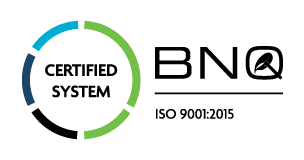According to the Business Development Bank of Canada, only 19% of Canadian businesses have gone digital. In a world that is becoming increasingly connected and automated, companies need to adopt new technology if they want to stay competitive.
At Adfast, we have undergone what many are calling a “digital transformation” in order to maintain our position as an industry leader.
In this article, find out all about digital transformation and discover how going digital has improved our business.
Digital transformation and business
For most people, the term “digital transformation” means using technology to increase productivity. While not incorrect, this is a very basic description of a complex process.
Let’s take the time to clearly define what digital transformation means in business.
Digital transformation definition
In business, digital transformation refers to the process of integrating digital technology into every aspect of a company’s operations, from production to management.
The digital transformation is already widespread in companies and industries across North America. The digital shift is also being called the “fourth industrial revolution” and “industry 4.0”, a term coined by Germany.
New technology implemented by a company going digital can include:
- Information systems (CRM, ERP, data management systems)
- Robotics and automation technology
- Artificial intelligence
- Cloud technology
- Tools that enable communication between systems
Why go digital?
There are many reasons for companies to go digital. With new digital technology, they can improve their operations, optimize production methods, and enhance customer experience.
Furthermore, companies that go digital can significantly reduce their expenses by automating various activities. Automation increases productivity, improves product quality, and reduces the number of dangerous tasks workers need to perform.
Since important information can be transmitted much faster electronically, a digitized work environment gives companies the ability to respond more quickly to customers and business partners, helping them build trust and confidence.
In short, going digital is a major competitive advantage that gives companies the tools to remain efficient and effective. On the other hand, businesses that put off their digital transformation risk losing market share to competitors and falling behind.
Adfast’s digital transformation
Adfast has successfully obtained BNQ 6545-200 – Industry 4.0 certification, which showcases companies from the manufacturing sector that have completed their digital transformation.
This certification was established by the Canadian Ministry of Economy and Innovation (MEI) and the Bureau de Normalisation du Québec (BNQ). It was awarded to Adfast for the interoperability of its various digital platforms, including its MES (Manufacturing Execution System), WMS (Warehouse Management System), ERP (Enterprise Resource Planning), marketing, and B2B e-commerce systems.
Since these acronyms may be unfamiliar to you, we have put together some concrete examples of ways in which the digital transformation has positively affected Adfast.
Optimizing production run scheduling
Since our production lines for sealants, adhesives, insulating foam and other products must be flushed out between runs to prevent the cross-contamination of chemicals and colours, it’s very important for production runs to be scheduled in the right order. Otherwise, a lot of product gets wasted.
Until recently, this complex scheduling was done by an employee. Now, with a digital database and artificial intelligence, our production schedules can be generated automatically in a way that reduces waste.
An intelligent program analyzes the available inventory, customer orders, and constraints such as the chemistry, colour, format and brand of the products that need to be produced and proposes the optimal sequence of production runs accordingly.
Better use of factors of production
With AI, Adfast can make better use of its physical and human resources. An intelligent program analyzes all available data and then proposes a production schedule that maximizes efficiency based on variables such as:
- The production capacity of each piece of equipment
- Work hours
- Available human resources
- Scheduled remedial maintenance
- Scheduled preventive maintenance
Of course, unforeseen events such as equipment failure, raw material shortages and urgent new customer orders can occur at any time.
In such cases, our intelligent program will detect the changes, run them through its algorithm and come up with an appropriate solution much more quickly than a human could.
Accurately predicting customer needs
Once production schedules and resources have been optimized, we can also use AI to predict sales and plan production runs pre-emptively. That means when new customer orders are received, products are either already in stock or can be manufactured much more quickly, thereby improving the total customer experience.
Demand can be predicted accurately by analyzing customer order history and correlating it with external factors such as weather, opportunities documented by sales representatives in the CRM, and even socio-economic trends.
Follow Adfast’s lead and go digital!
For companies, digital transformation means adopting new technology and making the most of it. The cornerstones of the shift may vary from business to business, but the digital revolution is sweeping through every industry.
Follow Adfast’s lead and join the movement to outpace your competition!



















